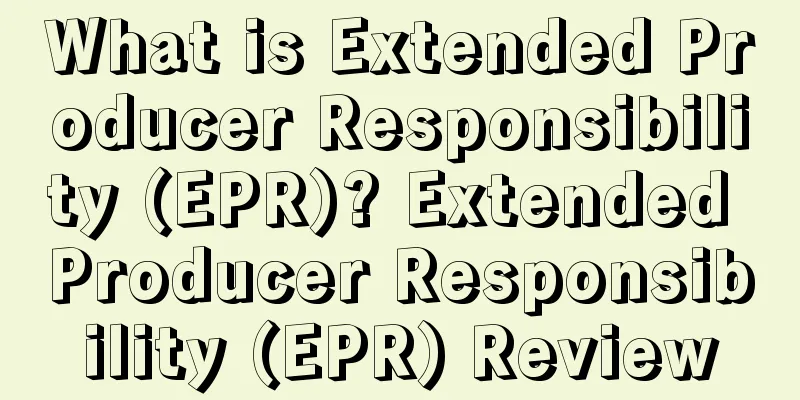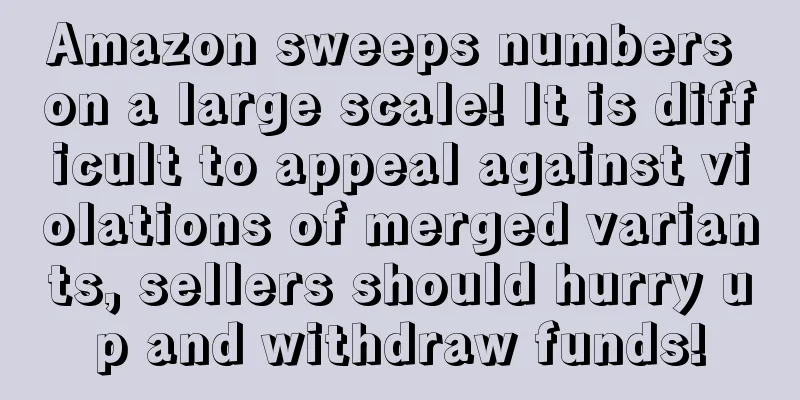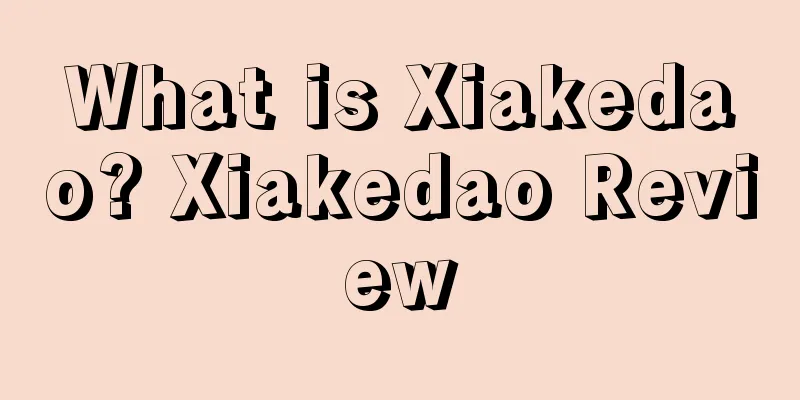What is Extended Producer Responsibility (EPR)? Extended Producer Responsibility (EPR) Review

|
Extended Producer Responsibility (EPR) is an environmental policy that requires producers to be responsible for the entire life cycle of the products they put on the market, from product design to the end of the product life cycle (including waste collection and treatment). According to the provisions of the Extended Producer Responsibility Regulation, the responsible party must reduce the impact of its products on the environment throughout the product life cycle. Registrant Product Producer Classification Environmental Protection concept The idea of extended producer responsibility can be traced back to Sweden's 1975 proposal on waste recycling and management. The proposal proposed that before the production of a product , the producer has the responsibility to understand how to deal with the waste product in an appropriate manner from the perspective of the environment and resource conservation when the product is discarded. The concept of Extended Producer Responsibility (EPR) was first proposed by Thomas Lindhquist, an environmental economist at Lund University in Sweden, in a report submitted to the Swedish Environment Agency in 1988. It is achieved by making producers responsible for the entire life cycle of the product, especially the recycling, circulation and final disposal of the product. Professor Thomas Lindhquist's EPR designed five responsibilities that producers must bear: ⒈ Environmental damage liability (Liability): Producers are responsible for proven environmental damage caused by their products. The scope of this responsibility is determined by law and may include all stages of the product life cycle . ⒉ Economic Responsibility: Producers pay all or part of the collection, recycling or final disposal of their products. Producers can assume economic responsibility in the form of certain specific fees. ⒊ Physical Responsibility: Producers must actually participate in dealing with their products or the impacts caused by their products. This includes: developing necessary technologies, establishing and operating recycling systems, and disposing of their products. ⒋ Ownership responsibility: During the entire life cycle of the product, the producer retains the ownership of the product, which involves the environmental issues of the product. 5. Informative Responsibility: Producers are responsible for providing relevant information about their products and their impact on the environment at different stages of their life cycle. Features ⒈EPR emphasizes the leading role of producers. Producers have control over product design and the use of raw materials. Producers are responsible for the recycling, regeneration and disposal of products after use. Producers must reconsider product design and raw material selection to reduce the impact of products on the environment. Introducing external incentives with producers as the entry point can ensure that incentive signals are smoothly transmitted upstream and downstream of the product chain, better reduce waste and encourage recycling. ⒉EPR emphasizes not only the responsibility of producers, but also the responsibility sharing of different roles in the entire product life chain, including consumers, sellers, recyclers and governments. ⒊ The responsibility in the EPR system should be limited to the post-consumption recovery, recycling and final disposal stages to reflect the connotation of "extension". As for the issues related to product responsibility before and during consumption, it is an independent form of responsibility and is regulated by relevant laws such as the Clean Production Promotion Law and the Product Quality Law. Implementation Status 1. United States The principle of extended producer responsibility is not emphasized in U.S. law. They oppose imposing EPR on producers, believing that it is inconsistent with the economic principle of "social cost optimization". Instead, they hope to consider the entire process of treatment and utilization of waste electronic and electrical products from a macro perspective and develop a management mechanism with clear responsibilities for each party . 2. European Union The EU stipulates that the disposal costs of waste electronic and electrical products will be borne by the manufacturers. For example, for color TVs or refrigerators, a recycling fee of about 2 to 3% will be charged for each unit, which will be added to the selling price of the product. 3. Japan Since 2001, Japan has stipulated that home appliance manufacturers, sellers and consumers have the obligation to recycle and reuse discarded home appliances and bear part of the costs. In the implementation process, manufacturers are responsible for recycling, regeneration and disposal, and the costs are borne by users. 3. China The responsibilities of the parties involved in the recycling of used household appliances and electronic products stipulated in the Regulations on the Management of the Recycling of Used Household Appliances and Electronic Products are as follows: 1) Producer Responsibilities of home appliance manufacturers. Home appliance manufacturers refer to manufacturers that produce and sell products under their own brands, brand providers that provide brands for other manufacturers to use , and consignees and agents of imported home appliance goods . ① Adopt design solutions that are conducive to recycling and reuse; select non-toxic and harmless substances and materials and recyclable materials; provide information on the main material components in the instructions of home appliances . ② Home appliance manufacturers can dispose of used home appliances on their own or entrust the disposal to a qualified disposal company. ③ Household appliance manufacturing enterprises shall provide the provincial-level resource comprehensive utilization administrative department of their location with relevant information such as the types of household appliances produced, production volume, sales volume and export volume. 2) Dealers and after-sales service agencies Home appliance dealers and after-sales service agencies have the obligation to recycle used home appliances, and the recycled used home appliances should be sold to qualified processing companies (hereinafter referred to as processing companies). Used home appliance dealers are not allowed to sell used home appliances that have not been tested and marked by processing companies. 3) Recycling companies Recycling companies (including individual businesses ) should sell the recycled used household appliances to processing companies and sign a commissioned recycling agreement with the processing companies. It is strictly prohibited to disassemble, assemble and sell them by themselves. 4) Processing Enterprises Processing companies should strictly follow relevant national standards and technical specifications to classify and test the recycled waste appliances. After testing and repair, the used appliances that meet the safety standards should be labeled as reused products and sold to used appliance dealers or sold in the second-hand goods trading market. Waste appliances should be dismantled under environmentally friendly and safe conditions, and toxic and hazardous substances should be harmlessly treated in accordance with relevant national regulations. It is strictly forbidden to use primitive and backward methods such as baking, pickling, and open-air burning to dismantle and treat waste appliances. The treatment process must comply with national environmental protection, labor safety and personnel health requirements. Confidential waste appliances should be handled in accordance with relevant confidentiality regulations. 5) Consumers Consumers should sell their old home appliances to home appliance dealers, after-sales service agencies, or recycling companies, and must not discard or dismantle them without authorization. Home appliances purchased with government funds by government departments at all levels and state-owned enterprises and institutions should be handed over to processing companies after replacement and scrapping, and asset write-off procedures should be handled in accordance with relevant national regulations. In terms of using legal levers, developed countries have detailed and clear legal provisions for the treatment and utilization of electronic waste, and they all emphasize resource recycling as a fundamental way to solve environmental problems. The United States, the European Union , Japan and China all agree with the EPR in principle, but there are still major differences on who will bear the economic costs of this responsibility . Therefore, the interpretation of the EPR content, the products that manufacturers need to bear responsibility for and the extent of the responsibility are not the same. Common EPR product categories The following are the categories of goods that fall within the scope of the extended producer responsibility obligations [in France and Germany] and for which the producer/seller is required to provide the marketplace or e-commerce platform with the extended producer registration number. France
Germany
Note: If you sell electrical and electronic equipment containing batteries in Germany, you must register both the electrical and electronic equipment and the battery categories. References |
<<: What is Blue Ocean Yiguan Network? Blue Ocean Yiguan Network Review
>>: What is GlobalData? GlobalData Review
Recommend
Amazon bans accounts on a large scale! A large number of sellers suffer!
Since 2024, Amazon's account sweeping campaign...
What is Matahari Mall? Matahari Mall Review
Matahari Mall is an Indonesian e-commerce platform...
An experienced operator with many years of experience in cross-border business will teach you how to effectively analyze Amazon advertising
text As an "old operator" who has been ...
Shein expands offline presence, launches first Forever 21 "store-in-store"
It is learned that in August this year, Shein anno...
What is Trackingmore? Trackingmore Review
Trackingmore is a package tracking platform that i...
What is Yandex.Money? Yandex.Money Review
Yandex.Money was founded in 2002 and is an electro...
US warehouse space is running out! Rents continue to rise
A MZ123 has learned that according to a new report...
What is trademark squatting? Trademark squatting review
Trademark squatting refers to the competitive beha...
The conflict between Russia and Ukraine has triggered an inflation storm. Six major changes are taking place in US consumption
It is learned that according to foreign media repo...
The severe shortage of baby formula in the United States has caused panic! Amazon Canada's prices and delivery fees are shocking!
<span data-shimo-docs="[[20,"美国婴儿奶粉严重缺货引起恐...
Is the seller's traffic being cut off during the peak season? Use free gifts to spread the word
In the past two days, the traffic of toy sellers o...
What impact has the subscription + e-commerce model had on the industry?
When discussing sales models that have an impact o...
Optimize your Amazon images, don’t forget to use these types of product images
Many Amazon users only look at the pictures when ...
What is Pinkman Cross-border Services? Pinkman Cross-border Services Review
Pinkman Cross-border Services is composed of a tea...
What is Fakespot? Fakespot Review
Fakespot is the best tool on the market for detect...







![[II] Amazon’s “coercion” and “betrayal”](/upload/images/67e6f678edd04.webp)

